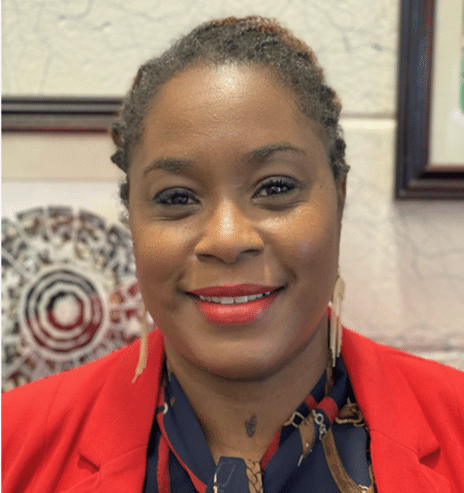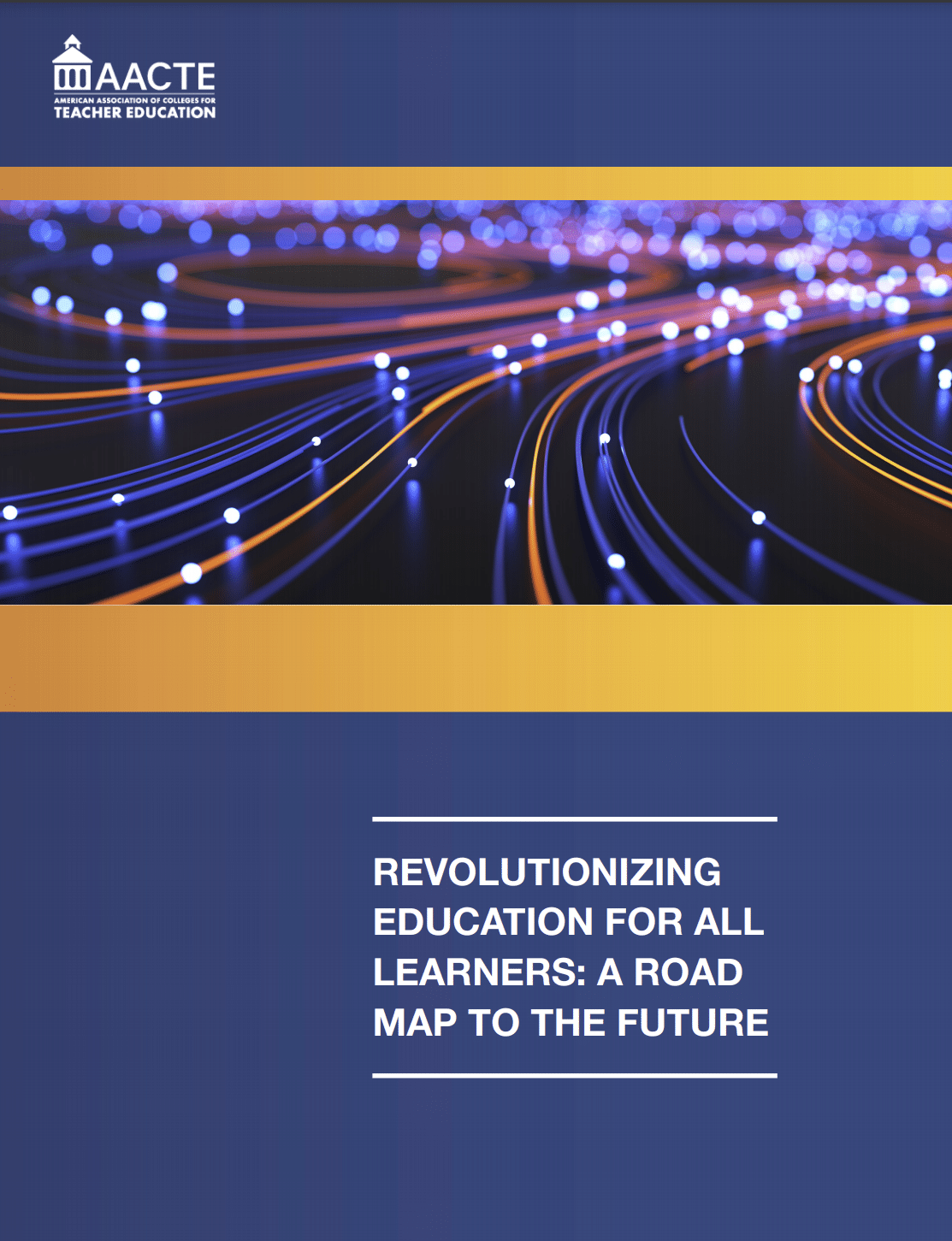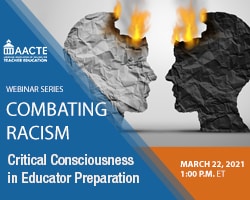23 Mar2021
By Weade James
AACTE is pleased to welcome new Holmes Scholars from the University of Louisville and the University of North Florida. These institutions’ expansion of their Holmes Program signals their continued commitment to investing in initiatives that seek to advance equity in the education profession.
 Easter Brown is in her second year in the pursuit of her Ed.D. Brown served as a classroom teacher for six years and three years as resident clinical faculty for a professional development school in partnership with the University of North Florida (UNF) before becoming an elementary school administrator. In continued efforts to bridge the gap between higher education and K-12 education, Brown serves as a member of the Business and Industry Leadership Team for Education and Human Services at Florida State College at Jacksonvilleand UNF’s Teaching, Learning, and Curriculum Advisory Board. Brown is passionate in culturally responsive pedagogy in elementary school curriculum and the leadership journeys of Black female educators in predominantly white institutions, specifically K-12 education.
Easter Brown is in her second year in the pursuit of her Ed.D. Brown served as a classroom teacher for six years and three years as resident clinical faculty for a professional development school in partnership with the University of North Florida (UNF) before becoming an elementary school administrator. In continued efforts to bridge the gap between higher education and K-12 education, Brown serves as a member of the Business and Industry Leadership Team for Education and Human Services at Florida State College at Jacksonvilleand UNF’s Teaching, Learning, and Curriculum Advisory Board. Brown is passionate in culturally responsive pedagogy in elementary school curriculum and the leadership journeys of Black female educators in predominantly white institutions, specifically K-12 education.
23 Mar2021
By Jennifer Manise

The Longview Foundation is seeking candidates for the GTE Fellows Program. The program is a year-long mentored virtual fellowship that focuses on integrating global learning outcomes into coursework for preservice educators.
Under the mentorship of experts in the field of global learning, each of the selected fellows will revise an undergraduate or graduate course that they teach in an initial teacher preparation program. The revised course will include global learning outcomes that will be enacted through engaging activities, resources and assessments aimed at promoting global learning. Fellows will then pilot and assess the revised course with a class of their own teacher candidates during the academic year. Applications are due April 7, 2021.
Apply now.
23 Mar2021
By Lynn Burdick
 There is no doubt the COVID-19 pandemic has caused unprecedented challenges in education. At the University of Illinois (U of I) in Urbana-Champaign, we are facing a lot of those challenges. However, I am trying to be the glass-half-full girl by saying there are a few things we have implemented in these past 12 months that I would like to see us put in place to stay.
There is no doubt the COVID-19 pandemic has caused unprecedented challenges in education. At the University of Illinois (U of I) in Urbana-Champaign, we are facing a lot of those challenges. However, I am trying to be the glass-half-full girl by saying there are a few things we have implemented in these past 12 months that I would like to see us put in place to stay.
When this pandemic is behind us, what best practices should we keep?
Technology for Collaboration, Engagement and Assessment
As we gradually move back into face-to-face classrooms, I know many teachers are ready to put the Chromebooks away! However, some teachers are continuing—and will continue—to apply the new technology skills and tools they discovered during online learning as they return to in-person teaching.
There are so many options for collaboration with creative uses of tools like Jamboard, Google Workspace, Padlet, and so many more. Technologies such as these have helped students who might not contribute when everyone is face-to-face actively participate in online activities. Quick online formative assessment tools have also made it easier for teachers to “take the temperature of the room” and make informed instructional decisions based on individual student learning.
23 Mar2021
By Anna Joseph, Ofelia Schepers and Kathryn Young
The widespread prevalence of trauma and subsequent impacts on student learning and behavior is well known and documented. PK-12 schools across the nation are integrating trauma-informed practices (TIP) to better respond to the needs of children who have experienced trauma. Furthermore, there are an increasing number of educator preparation programs that offer trauma training to their teacher candidates. This blog outlines one educator preparation program’s efforts to prepare its students in TIP.
The Metropolitan State University of Denver School of Education (SOE) in partnership with local non-profit Resilient Futures is integrating TIP into its entire curriculum. TIP is merged seamlessly with existing course learning objectives, ensuring that all students graduate competent to recognize and address the needs of children who have experienced trauma in their future classrooms and school settings. It is important for novice educators to have TIP integrated into their overall teacher preparation rather than required as an additional class or training to their already-crowded programs of study. With TIP integrated into course learning objectives, students understand how TIP is fundamental to all aspects of teaching and classes and not supplemental or add-on.
22 Mar2021
By Jane E. West
This blog post is written by AACTE consultant Jane West and is intended to provide updated information. The views expressed in this post do not necessarily reflect the views of AACTE.
The Biden Agenda Continues to Unfold
The Biden Administration is on the brink of distributing the nearly $122 billion in new COVID relief funding for the nation’s K-12 schools, which the Education Department said would be made available to states “this month.” Education Secretary Miguel Cardona notified state officials on Wednesday about the share of funding they would receive from the American Rescue Plan Act (ARPA) that President Biden signed last week. States and school districts “should plan to expend these funds to safely reopen schools as expeditiously as possible this spring, sustain their healthy operations, and address the significant academic, social, emotional, and mental health needs of their students,” Cardona wrote in the letter to state school chiefs.
Cardona joined White House Press Secretary Jen Psaki for her daily press briefing on Wednesday. During the Q&A with the press pool, Cardona touched on COVID-19 relief, school reopening, and standardized testing. The Secretary told reporters he didn’t plan to change the Education Department’s decision on standardized testing, which was announced in February before he was confirmed by the Senate. “The guidance that we provided at the agency last month is the guidance that we’re going with moving forward on assessments to see where students are after this pandemic,” Cardona said.
22 Mar2021
By Lynn M. Gangone and Daniel Domenech

Adobe Stock Photos
AACTE President and CEO Lynn M. Gangone and Daniel A. Domenech, executive director of AASA, The School Superintendents Association, authored this article that originally appeared in the District Administration and is reprinted with permission.
 Our nation’s education ecosystem is complex and multifaceted. When one component of the ecosystem is impacted, it creates a ripple effect that is felt throughout the entire system. The onset of the COVID-19 pandemic created a tidal wave of uncertainties, resulting in budget cuts, teacher shortages, and remote learning challenges.
Our nation’s education ecosystem is complex and multifaceted. When one component of the ecosystem is impacted, it creates a ripple effect that is felt throughout the entire system. The onset of the COVID-19 pandemic created a tidal wave of uncertainties, resulting in budget cuts, teacher shortages, and remote learning challenges.
An ongoing concern for school districts, teacher shortages have now become more severe. Teachers are leaving the profession at an accelerated rate, due primarily to health concerns and budget furloughs, and forcing superintendents to close schools not because of infection, but due to a lack of personnel to keep them open. The shortage also expands beyond teachers. It includes bus drivers, cafeteria workers, custodians, and essential support staff. Such reductions, caused by budget cuts resulting from the pandemic, are having a crippling effect upon school districts, and increased operational costs are eroding critical funds necessary to hire the staff desperately needed for in-school instruction.

19 Mar2021
By Meghan Grenda
 AACTE’s Member Spotlight features an individual from a member institution, highlighting how their work makes a difference in classrooms across the country. Nominate yourself or another member by providing a response to the following questions and sending to mgrenda@aacte.org.
AACTE’s Member Spotlight features an individual from a member institution, highlighting how their work makes a difference in classrooms across the country. Nominate yourself or another member by providing a response to the following questions and sending to mgrenda@aacte.org.
Get to know Tracie McLemore Salinas …
Position/Institution: Director, Mathematics and Science Education Center, Appalachian State University; Professor, Department of Mathematical Sciences
Number of years in your position: I am in my 17th year at Appalachian State as a faculty member and my first year as Director of the Mathematics and Science Education Center.
Alma Mater: B.S. William Carey University, Hattiesburg, MS; M.S. and Ph.D. University of Tennessee – Knoxville
19 Mar2021
By Meghan Grenda

AACTE understands that 2020 was a difficult year for higher education institutions and many are still facing operational challenges. As such, AACTE is extending the membership renewal deadline to May 31, 2021.
To renew your AACTE membership
- Submit Your Renewal via Credit Card: Visit your AACTE Profile to submit payment online.
- Submit Your Renewal via Check: Make payable to “AACTE” and mail to AACTE, PO Box 825490, Philadelphia, PA 19182-5490. Please note the AACTE mailing address has changed.
19 Mar2021
By Lynn M. Gangone
On behalf of the American Association of Colleges for Teacher Education (AACTE), President and CEO Lynn M. Gangone issued the following statement today responding to recent hate crimes toward the Asian-American and Pacific Islander (AAPI) community:
“AACTE believes that to educate is to enlighten. As such, our Association remains committed to educating all learners in PK-12 and higher education institutions to enlighten and empower the next generation of citizens. As an educational association of colleges and universities that values the diversity of students, their families, and educators, AACTE condemns the escalation of violence and harassment toward our AAPI colleagues, students, and friends.
19 Mar2021
By Jerrica Thurman
 The American Association of Colleges Teacher Education (AACTE) released today its latest report, Revolutionizing Education for All Learners: A Road Map to the Future. The research closely examines the Association’s new strategic vision—to revolutionize education for all learners—for a comprehensive understanding on how best to serve the nation’s PK-12 public school students during a COVID-era. It also offers invaluable perspectives on AACTE’s key priorities for the educator preparation community to guide the profession through the coming decade from the lens of thought leaders at influential grant-making and public policy organizations, as well as a cross-section of deans of education at diverse U.S. institutions.
The American Association of Colleges Teacher Education (AACTE) released today its latest report, Revolutionizing Education for All Learners: A Road Map to the Future. The research closely examines the Association’s new strategic vision—to revolutionize education for all learners—for a comprehensive understanding on how best to serve the nation’s PK-12 public school students during a COVID-era. It also offers invaluable perspectives on AACTE’s key priorities for the educator preparation community to guide the profession through the coming decade from the lens of thought leaders at influential grant-making and public policy organizations, as well as a cross-section of deans of education at diverse U.S. institutions.
“This report is a compilation of interviews with key foundation, advocacy, and research stakeholders who affirm AACTE’s vision,” said Lynn M. Gangone, AACTE president and CEO. “AACTE is grateful for the insights and affirmations of these engaged, knowledgeable leaders who understand what is required for AACTE to become a visionary and effective agent of change.”
18 Mar2021
By Leslie T. Fenwick
 Earlier this year, in my role as AACTE’s dean in residence, I had the privilege of interviewing 13 engaged and knowledgeable thought-leaders at influential grant-making and public policy organizations, as well as a cross-section of deans of education at diverse U.S. institutions. These individuals are leaders at Carnegie Foundation of New York, Spencer Foundation, Kellogg Foundation, Harvard University, Clark Atlanta University (an HBCU), Kansas State University (a land grant institution), Excelencia in Education, the Washington Lawyers Committee on Civil Rights, and the Center for American Progress, among others.
Earlier this year, in my role as AACTE’s dean in residence, I had the privilege of interviewing 13 engaged and knowledgeable thought-leaders at influential grant-making and public policy organizations, as well as a cross-section of deans of education at diverse U.S. institutions. These individuals are leaders at Carnegie Foundation of New York, Spencer Foundation, Kellogg Foundation, Harvard University, Clark Atlanta University (an HBCU), Kansas State University (a land grant institution), Excelencia in Education, the Washington Lawyers Committee on Civil Rights, and the Center for American Progress, among others.
I began the interviews asking these leaders two questions related to AACTE’s new vision which is to collaborate with members and partners to revolutionize education for all learners.
- Is “revolution” the most appropriate term to describe what is needed in our PK-12 education system?
- Is a revolution needed? If so, what do you think it will take to revolutionize education for all PK-12 learners?
16 Mar2021
By Candace Johnson and Michael Douglas

Houston Endowment has awarded Prairie View A&M University’s Whitlowe R. Green College of Education (WRGCOE) one of the college’s largest grants in its 141-year history. The foundation is investing $1.5 million in the College to support PVAMU’s Educator Preparation Program, increasing the number of qualified teachers of color and preparing the educators for long-term success. The grant is part of $20M in funds the Houston Endowment awarded to several Houston area organizations committed to making racial equity and social justice in Houston a reality.
16 Mar2021
By Leslie Ekpe
The Coronavirus (COVID-19) pandemic brought immediate changes to the normalcy of pedagogy practiced within the classroom. Because of the changes, educators are tasked with establishing innovative approaches to teaching in making the learning process more engaging. For a variety of factors, technology-enhanced learning (TEL) is critical. It is critical not only because it is the current educational standard but also because it can enhance the way we develop the education system (Carrillo and Flores, 2020). The Applying Technology-Enhanced Teaching Strategies to the New Normal in 2021 and Beyond session at the AACTE 2021 Annual Meeting took a deeper dive into the need for more teacher preparation programs that adopt inclusive approaches to educating at all levels of education.
16 Mar2021
By Jane E. West
 This blog post is written by AACTE consultant Jane West and is intended to provide updated information. The views expressed in this post do not necessarily reflect the views of AACTE.
This blog post is written by AACTE consultant Jane West and is intended to provide updated information. The views expressed in this post do not necessarily reflect the views of AACTE.
President Biden Signs Massive $1.9 trillion American Rescue Plan Act
On Thursday evening, just before a primetime address to the nation, President Biden signed into law the American Rescue Plan Act of 2021 (ARPA).
The House gave its final approval of the bill on Wednesday. Congressional Republicans, who voted en masse against the bill, have criticized the deal for funneling money to schools that haven’t offered in-person instruction despite earlier rounds of pandemic relief.
ARPA includes $122.8 billion for the Elementary and Secondary School Emergency Relief Fund (ESSER). ESSER funds will be distributed to states in the same way that the last two federal rescue packages were distributed: based on their relative Title I, Part A funding. The first $800 million of ESSER funding must be used by states to provide educational and wraparound services to students experiencing homelessness. The bill requires states to distribute the remaining $122 billion in the following manner :
- Local Education Agencies (LEAs) ($109.8 billion): Ninety percent of funding will be distributed to districts based on their relative share of Title I, Part A funding.
- Lost Learning Time ($6.1 billion): States must use at least 5% of their ESSER funding “to address learning loss by supporting the implementation of evidence-based interventions, such as summer learning, extended day, or extended school year programs, and ensure such interventions respond to students’ academic, social, and emotional needs and address the disproportionate impact of the coronavirus on [students of color, students from families experiencing low-incomes, students with disabilities, English language learners, migrant students, students experiencing homelessness, and students in foster care].”
- After-School Programs ($1.2 billion): A minimum of 1% of state funding must be used for after-school programs that address students’ academic, social, and emotional needs.
- Summer Enrichment Programs ($1.2 billion): At least 1% of funding must be used by states to provide students with evidence-based summer learning programs.
- Administration Costs ($610 million): States can spend up to 0.5% of their funding on the costs of administrating this program.
- Remaining State Funds ($3 billion): States will be allowed to use these funds on any of the allowable uses in the act.
LEAs will be required to use at least 20% of the funds they receive ($22 billion) to address lost learning time for students. They will have the freedom to spend the remaining 80% ($87.8 billion) of funding based on local needs and priorities. Senate Democrats are circulating a Congressional Research Service memo with estimates of Education Stabilization Fund totals for states and institutions of higher education (IHE). It breaks out funding by state for the K-12 fund, the non-public schools, and the higher education fund (by state and by type of IHE). The last pages aggregate each state’s total from all three emergency relief funds.
In the final bill, a number of amendments approved by the Senate were included that increased funding for students with disabilities, students experiencing homelessness, and sought transparency in school district’s plans for reopening and addressing continuity of services.
- As amended, the legislation provides $2.6 billion in additional funding for state special education grants under the Individuals with Disabilities Education Act (IDEA) for this fiscal year, which ends Sept. 30. In addition, the legislation provides $200 million for special education preschool grants, and $250 million for infants and toddlers with disabilities, both under the IDEA.
- The Senate took $2.75 billion out of the House bill’s K-12 relief fund and earmarked it for private schools. Governors would allocate this money.
- Maggie Hassan (D-N.H) offered an amendment that will ensure schools are transparent in their plans surrounding reopening and learning opportunities. The amendment says that within 30 days of receiving this new relief funding, school districts will have to publish “a plan for the safe return to in-person instruction and continuity of services.”
- Lisa Murkowski, (R-AK) introduced an amendment that was agreed to by the Senate that provides $800 million help identify students experiencing homelessness, and to provide those students with wraparound services.
Other elements of the bill that are worth noting include:
- States and schools must reserve roughly 25 percent of the stabilization fund for learning recovery (e.g. summer school and extended-day programs).
- $350 billion is available for state and local governments.
- $7 billion is available to help students and educators connect to the internet and provide them with connected devices, through the federal E-Rate program.
- $39 billion will go to early-childhood programs, including Child Care and Development Block Grants and a stabilization fund for child-care providers.
- Language in ARPA would punish states that want to enact/expand a new voucher tax credit by requiring them to pay back the equivalent amount of federal aid dollars as the tax credit they are issuing.
- Families can claim up to $3,600 per child under age 6 and $3,000 for children up to age 17 for one year to help combat the economic damage of the pandemic. House Democrats are looking to make the tax change The current tax credit is up to $2,000 per child.
The bill also includes about $40 billion for higher education—about half of which will go to emergency funding in grants to students. ACE President Ted Mitchell said that while the amount of higher ed funding “falls short of our most recent estimate of at least $97 billion in student and institutional needs, it still represents the largest federal effort so far to assist students and families struggling to cope with lost jobs or reduced wages and colleges and universities facing precipitous declines in revenues and soaring new expenses.” Additional funds will go to support Historically Black Colleges and Universities, Tribal Colleges and Universities, Hispanic-Serving Institutions, and other Minority-Serving Institutions. A provision is included in the bill that would exempt all student loan forgiveness from federal taxes for five years, perhaps paving the way for expanded student debt cancellation.
As I close, I offer a big shout out to one of our own—Kim Knackstedt—who has been named as the first White House Director of Disability Policy. With her Ph.D. in special education and several years of experience working on Capitol Hill, Kim is imminently qualified for this position. I know you join me in congratulating her!
And a big thank you to Kaitlyn Brennan for her research and writing for this Washington Update.
Read the full Washington Update on my website for more information.
15 Mar2021
By Nicole Dunn
 AACTE is honored to welcome three panelists from member institution Rowan University to lead its next webinar in the Combating Racism in Educator Preparation Series. For this installment, Monika Shealey, Shelley Zion, and Beatrice Carey, who are among those leading the creation and implementation of Rowan’s DEI certificate program, will teach participants to tune into their critical consciousness to sustain a lifelong commitment to addressing structural oppression.
AACTE is honored to welcome three panelists from member institution Rowan University to lead its next webinar in the Combating Racism in Educator Preparation Series. For this installment, Monika Shealey, Shelley Zion, and Beatrice Carey, who are among those leading the creation and implementation of Rowan’s DEI certificate program, will teach participants to tune into their critical consciousness to sustain a lifelong commitment to addressing structural oppression.
The Critical Consciousness in Educator Preparation webinar will take place on Monday, March 22, 1:00-2:15pm EST. In this interactive webinar, attendees will learn and practice several foundational strategies based on the certificate program modules. Whatever your role and wherever you are on the lifelong path of being a genuinely antiracist, abolitionist, and intersectional educator, you will benefit from this webinar as either a starting or reflective framework for the individual educator to live and promulgate these values through the field.
 Easter Brown is in her second year in the pursuit of her Ed.D. Brown served as a classroom teacher for six years and three years as resident clinical faculty for a professional development school in partnership with the University of North Florida (UNF) before becoming an elementary school administrator. In continued efforts to bridge the gap between higher education and K-12 education, Brown serves as a member of the Business and Industry Leadership Team for Education and Human Services at Florida State College at Jacksonvilleand UNF’s Teaching, Learning, and Curriculum Advisory Board. Brown is passionate in culturally responsive pedagogy in elementary school curriculum and the leadership journeys of Black female educators in predominantly white institutions, specifically K-12 education.
Easter Brown is in her second year in the pursuit of her Ed.D. Brown served as a classroom teacher for six years and three years as resident clinical faculty for a professional development school in partnership with the University of North Florida (UNF) before becoming an elementary school administrator. In continued efforts to bridge the gap between higher education and K-12 education, Brown serves as a member of the Business and Industry Leadership Team for Education and Human Services at Florida State College at Jacksonvilleand UNF’s Teaching, Learning, and Curriculum Advisory Board. Brown is passionate in culturally responsive pedagogy in elementary school curriculum and the leadership journeys of Black female educators in predominantly white institutions, specifically K-12 education.







 There is no doubt the COVID-19 pandemic has caused unprecedented challenges in education. At the
There is no doubt the COVID-19 pandemic has caused unprecedented challenges in education. At the 
 Our nation’s education ecosystem is complex and multifaceted. When one component of the ecosystem is impacted, it creates a ripple effect that is felt throughout the entire system. The onset of the COVID-19 pandemic created a tidal wave of uncertainties, resulting in budget cuts, teacher shortages, and remote learning challenges.
Our nation’s education ecosystem is complex and multifaceted. When one component of the ecosystem is impacted, it creates a ripple effect that is felt throughout the entire system. The onset of the COVID-19 pandemic created a tidal wave of uncertainties, resulting in budget cuts, teacher shortages, and remote learning challenges.
 AACTE’s Member Spotlight features an individual from a member institution, highlighting how their work makes a difference in classrooms across the country. Nominate yourself or another member by providing a response to the following questions and sending to
AACTE’s Member Spotlight features an individual from a member institution, highlighting how their work makes a difference in classrooms across the country. Nominate yourself or another member by providing a response to the following questions and sending to 
 The
The 
 This blog post is written by AACTE consultant Jane West and is intended to provide updated information. The views expressed in this post do not necessarily reflect the views of AACTE.
This blog post is written by AACTE consultant Jane West and is intended to provide updated information. The views expressed in this post do not necessarily reflect the views of AACTE.  AACTE is honored to welcome three panelists from member institution Rowan University to lead its next webinar in the Combating Racism in Educator Preparation Series. For this installment, Monika Shealey, Shelley Zion, and Beatrice Carey, who are among those leading the creation and implementation of Rowan’s DEI certificate program, will teach participants to tune into their critical consciousness to sustain a lifelong commitment to addressing structural oppression.
AACTE is honored to welcome three panelists from member institution Rowan University to lead its next webinar in the Combating Racism in Educator Preparation Series. For this installment, Monika Shealey, Shelley Zion, and Beatrice Carey, who are among those leading the creation and implementation of Rowan’s DEI certificate program, will teach participants to tune into their critical consciousness to sustain a lifelong commitment to addressing structural oppression.